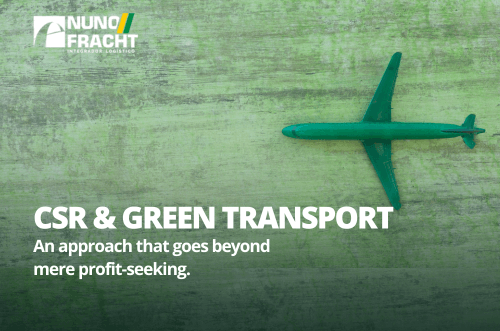
Nuno//Fracht is part of the Fracht Group, an organization committed to global citizenship, practical initiatives and ongoing efforts to achieve environmental and social goals.
Aligned with the United Nations Sustainable Development Goals (SDGs), the Fracht Group empowers its human resources to effectively complement their financial investments in renewable energy, sustainable transportation options and recycling.
The Fracht Group – and, consequently, Nuno//Fracht – understands the concept of sustainability to be twofold: Corporate Social Responsibility (CSR) and Green Transportation.
CSR
This approach transcends mere profit-seeking, also focusing on the well-being of employees and neighboring communities. Given the importance of the logistics sector in the global supply chain, as highlighted in the UNCTAD’s “World Investment Report”, the need to adopt effective CSR strategies that take into account various stakeholders becomes even more pronounced.
Sustainable practices can minimize the environmental impact of transporting goods. However, initiatives aimed at the well-being of employees and the communities where the company operates are equally crucial. Thus, CSR not only complements, but also demands a multifaceted approach to dealing with the complex socio-environmental issues inherent in our operations.
Green Transportation
The term is self-explanatory and refers to the sustainable transport methods we organize for our clients. Emissions from the various modes of transportation often causes a significant environmental impact. Therefore, it is our mission, to look for alternatives to reduce them.
Recently, Ruedi Reisdorf, president of the Fracht Group, communicated that until the end of last year, it was believed that green transport could be “offset” – that is, if you purchased a quantity of CO2 certificates for a forestry project, for example, you could deduct these positive numbers from your own emissions.
However, according to him, it turned out that these projects fell short of expectations. Reisdorf was keen to point out that forestry projects have not lost relevance; however, the actual benefits have turned out to be less than advertised.
Then, the focus should be on avoiding CO2 emissions. Similarly, “we all can, and must, take action!”

